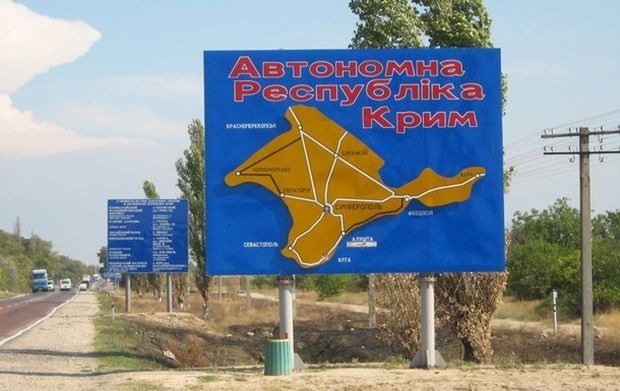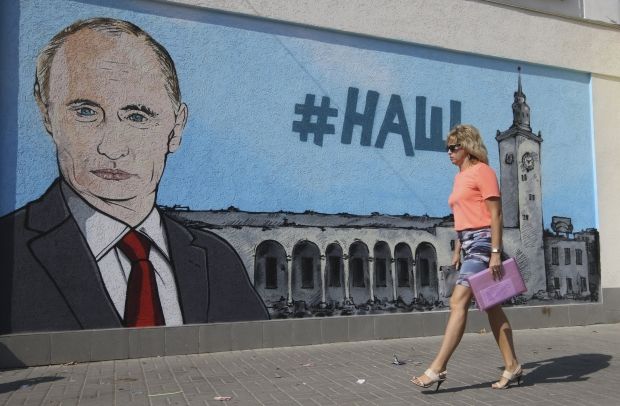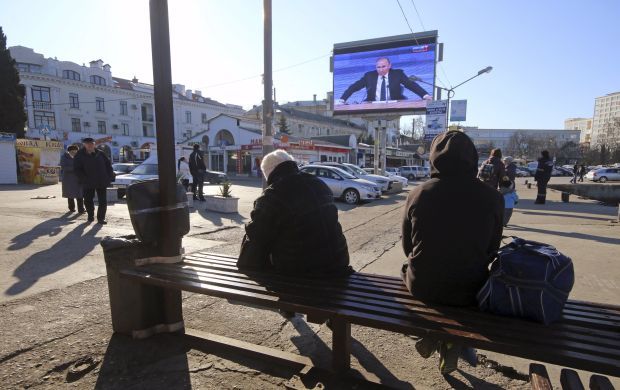
First step in Ukraine’s strategy on Crimea
In 2016, Ukraine will continue to look for mechanisms of de-occupation of the Russian-annexed Crimea. UNIAN has asked the experts, how realistic can be the Geneva Plus format of negotiations recently proposed by President Poroshenko.
At his first press conference after the New Year’s holidays, President of Ukraine Petro Poroshenko said that Ukraine is considering setting up a new negotiating format for the de-occupation of Crimea - "Geneva plus." Poroshenko noted that the struggle for the return of Crimea remained on the agenda and Ukraine would suggest an international mechanism of de-occupation of the peninsula. The optimal format is “Geneva Plus”: with the participation of our partners from the EU, USA and, probably, signatory countries of the Budapest Memorandum,” the president said.
Poroshenko has already tried to return the "Crimean issue" on the international agenda in October 2015 at the Normandy Four meeting in Paris. The activists’ move on a blockade of at the de-facto border with the peninsula has also contributed to it. At the same time, German Chancellor Angela Merkel said that the Minsk format does not include restoration of Ukraine's sovereignty over Crimea.
Roughly speaking, for the period of the Minsk process, the West turned a blind eye to the question of Crimea. But while the parties to the Minsk-2 claim relative success in the framework of the Minsk deal, it is also time to return to negotiations on the Crimean issue.
Ukraine’s ex-Foreign Minister Volodymyr Ohryzko said that, to achieve this goal, the Geneva Plus format would be the most appropriate and effective one. Ohryzko believes that participation in talks of guarantor states of Ukraine's territorial integrity, inviolability of its borders, and national security is crucial to the success of the dialogue. "Of course, the EU should also be part of these talks, being represented by a country, or countries, which Brussels will appoint. At present, the EU is represented in the Normandy format by Germany and France. It is possible that this option will also work for talks on Crimea, or maybe the EU will be represented as a separate structure. Then the conversation will be really serious and will have a practical outcome," said Ohryzko.
"We need exactly the format that will let the parties make decisions," he said.
At the same time, the ex-minister admits that Russia will not agree to such a format. However, such a position will only prevail as long as the Russian Federation has the economic "safety cushion." Given that Russia's economy is "deflating" at a frantic pace, there will be nothing left of this cushion pretty soon. And by the time, the Geneva Plus format will have to tell the aggressor state, what, how and when it should do in order not to get new sanctions over Crimea.
"That's when we'll have a fast and efficient progress toward the restoration of the status quo as it was in February, 2014," said Volodymyr Ohryzko.

The thing is that that the restrictions over Crimea, as compared to the anti-Russian sanctions over Donbas, are essentially cosmetic. In particular, this is a ban on entry to the different countries against nearly 400 people, including Crimean officials and citizens of the Russian Federation related to the annexation of the peninsula. In addition, 40 Crimean companies are prohibited from operating on the territory of the countries that have imposed sanctions. At the same time, there are no painful sectoral sanctions, financial, economic and trade restrictions against Russia over Crimea.
A signal to the West
Actually, the idea of Geneva Plus was voiced within a framework of preparing to such a scenario. In fact, this is Ukraine’s first clear proposal to international partners as to how to address the "Crimean issue." "That is, this proposal explains what can be done after Donbas settlement is complete," said political analyst at the Institute for Euro-Atlantic Cooperation Volodymyr Horbach.
According to him, Petro Poroshenko looks ahead, referring to the first Geneva negotiation format, turning to the guarantors of Ukraine’s territorial integrity under the Budapest Memorandum. "This is just probing the soil at the moment. Now he is just offering such format to the international partners, this is a proposal for consideration," the expert said.
Horbach believes that the establishment of such format, in principle, looks quite realistic. But there is one condition – consent of the aggressor state, Russia, to work in this format.
The official position of Russia today is that the Kremlin simply refuses to discuss the issue of Crimea and return of the Ukrainian sovereignty over the territory of the autonomy. However, echoing Ohryzko, Horbach said that, as the economic crisis deepens and the internal contradictions in Russia increase, the Kremlin officials will realize that they not only need the Western anti-Russian sanctions lifted, they need financial assistance from international organizations. Then Russia will actually sit down at the negotiating table to discuss the future of the peninsula.
"In this regard, Russia is in a completely different situation today than it was two years ago. And there is a totally different global context of world politics and especially the economy now," said the analyst.
In this regard, in his opinion, even the removal of the anti-Russian sanctions over Donbas will not save the Russian economy. And if the process of Crimean settlement does not start, the West may impose new sanctions, already bound to Crimea.
In any case, it shouldn’t be expected that Geneva Plus will work in parallel with the Minsk process. Establishment of an effective mechanism for solving the Crimean issue is a longer-term prospect.
Offensive position
At the same time, in order to retain the Crimean issue on global agenda, Ukraine needs to go to the international courts, putting forward and defending its claims, first of all, with respect to material losses inflicted by the Russian occupation. Horbach believes that an important factor in the information policy over Crimea can also become Ukraine's membership in the UN Security Council in 2016. This platform allows Kyiv to appeal constantly to its Western partners, as well as to mention the Russian annexation of Crimea in any communication with the Russian officials.
Horbach is positive this will strengthen Ukraine strategically, while the Russian side will be weakened. The longer the struggle for Crimea, the bigger Ukraine’s chances to reclaim the peninsula. "Russia will continue to weaken and will be able to afford to abandon Crimea, if the price will be the preservation of Russia’s integrity without Crimea. In this global context, the Crimean issue can be resolved,” the expert says.

Director of the Center for Middle Eastern Studies Ihor Semyvolos also believes that the Geneva Plus initiative can only be implemented if Russia is ready to accept the fact that this is actually the problem. "It is clear that the time has not come yet for Russia, but we need to articulate the approaches, so that in the future, when the time comes for establishing such a group, it would be clear what Ukraine wants and how it wants to achieve this," he said.
Semyvolos considers that such a statement by the president of Ukraine is a sort of a signal to Ukraine’s allies and the signatories of the Budapest memorandum that Ukraine begins a more active political game in this direction. "We remain in a strategic game, and we offer an option of developments in this game. This is already an offensive position for Ukraine," he said.
In addition, the expert believes that such talks must involve the United States: "It comes from the Budapest Memorandum, so they simply cannot dismiss it. This is a ball we threw at the pitch of EU and the U.S. And they need to respond accordingly. They can’t say “no, we won’t do anything” just by definition because it would destroy the entire system of international law.”
According to Semivolos, such a position of Ukraine is a win-win game. But it should not be expected that quick results will be harvested. "We need to understand that this involves certain depth, like any strategy game. Obviously, there will be all sorts of political bargaining, various talks, and visits. We see that diplomacy has intensified, and that is good. Because when diplomats talk, the guns remain silent," he said.
The agenda of talks
In turn, the diplomat and former Consul General of Ukraine in Istanbul and Edinburgh, chairman of the Maidan of Foreign Affairs foundation, Bohdan Yaremenko, also believes that the format of Crimea talks must include the actors that can influence the situation the most. However, the main thing Ukraine needs to achieve in his opinion is not just separate meetings over Crimea, but the discussion of the complex issues related to the Russian aggression against Ukraine. And perhaps the complex issues regarding Russia’s aggressive foreign policy in the Caspian and the Black Sea regions. "The problems of Ukraine are not unique. Both Moldova and Georgia are affected by the same problems, as well as Azerbaijan, partially. It’s very important to formulate the agenda. The question of the format of talks is important but it’s secondary priority compared to that of the agenda," the diplomat said.
“If the EU and the United States set out to achieve this agenda and format of talks, then Russia might have no other choice, being subject to sanctions, given the situation in the economy and plunging energy prices," said Yaremenko. In addition, the card can be played of Russia's desire to expand the list of participants in the negotiations or diplomatic consultations on Syria, according to the expert.
In other words, the opportunities are emerging to make Russia agree to start a dialogue on Crimea, and there will be more of such opportunities.
Kostyantyn Honcharov

